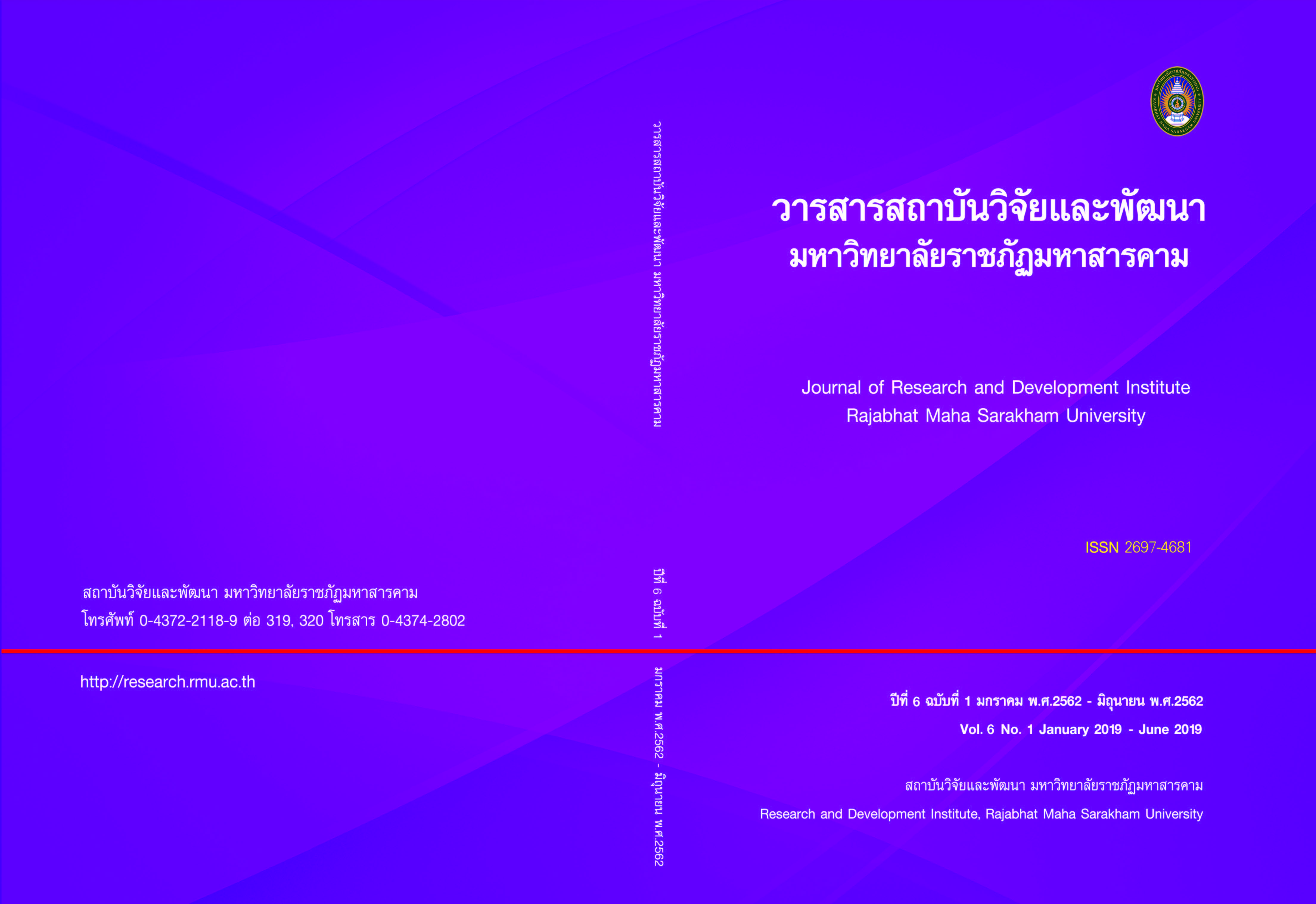Development of Small School Management Model Based on the Philosophy of Economic Sufficiency
Keywords:
Form of Small-sized Schools Administration, Philosophy of Sufficiency EconomyAbstract
This research aimed to study the element of the management form in a smallsized school, construct and develop a small- sized school model based on the Philosophy of Economic Sufficiency, and estimate the management form in a smallsized school based on the Philosophy of Economic Sufficiency by the experiment. This research was conducted using three phases. The first phase was to study the element of management form in a small-sized school by the synthesis document and related studies. The second phase was to construct and develop a small-sized school model based on the Philosophy of Economic Sufficiency by the 11 model schools. The research tools were the questionnaire, in-depth interview, focus group discussion to construct form and connoisseurship in order to investigate and assure model. The third phase was to evaluate the management form in a small-sized school based on the Philosophy of Economic Sufficiency by the experiment with a small-sized school, Ban Nongbueng School, Primary Education Service Area Office of Roi-et area 2 in three academic years. The evolution and using format from 91 participants by using quality measure of practicing list based on indicator model and satisfaction survey. The research findings were as follows: 1. The form of small-sized schools administration applying the Philosophy of Economic Sufficiency consisted of 5 main components 1) the schools administration, 2) the curriculum and teaching administration, 3) the activity development, 4) the personnel development, 5) the results and image of success. 2. The results of constructing and form developing for small-sized schools administration follow the Philosophy of Economic Sufficiency. After examining and confirming the form by the experts, they have related comments that the form is suitable for applying. 3. The results of evaluation form in small-sized schools administrations that follow the Philosophy of Economic Sufficiency by the implementation. This found that the schools performed the steps inclusively. Every group participated in and applied the results to use causing the small-sized schools administration following the philosophy of sufficiency economy worked systematically. Also, this can help smallsized schools administration have more quality and have the result of quality evaluation about component and indicator lists form at high level. The groups of researchers have comments with small-sized schools administrations following the Philosophy of Economic Sufficiency at high level too.
References
Eisner. E.W. (1976). The Educational Imagination. New York : Macmilan.
Keeves. P.J. (1988). Education research Methodology and measurement: An international Handbook. Oxford: Pergamum Press
Ministry of Education. (2009). Sufficiency economy supervision guidelines for educational institutions. Bangkok : Bureau of Special Affairs, Office of the Permanent Secretary for Education. [in Thai].
Natthaphong Thongphakdee. (2011). Sufficiency economy philosophy: historical background and interpretation. Bangkok : Sufficiency Economy Study Center: National Institute of Development Administration. [in Thai].
Office of Policy and Strategy, Ministry of Education. (2007). 15 years of quality free education policy implementation. Documentation for the training meeting for the development of provincial education plan (2010- 2013). [in Thai].
Office of the Basic Education Commission. (2007). Driving policy of the Office of Basic Education Commission 2007-2008. Bangkok : The Agricultural Cooperative Assembly of Thailand Limited. [in Thai].
Phoodit Phatphin. (2012). The development of the school management model according to the sufficiency economy philosophy of Schools under the Office of the Basic Education Commission. Ph.D. thesis (Educational Administration): Valaya Alongkorn Rajabhat University. [in Thai].
Piyaporn Mundajit. (2010). The knowledge communities : National Knowledge Center Project. Bangkok : Ministry of Information and Communication Technology. [in Thai].
Sakthai Bowornkit and Waro Phengsawat (2011). “A Model of Effectiveness Development Management on Academic Affairs in Small Schools under the Office of Basic Education Commission”. Asia-Pacific Journal of Science and Technology, 3 (6) : 13-33 : 2011. [in Thai].
Samrit Kangpheng. (2008). Administration Factors Affecting School Effectiveness : Model Development and Validation. Doctor of Education thesis : Khon Kaen University. [in Thai].
Seree Chadcham. (1995). Model. Bangkok : Children's Club. [in Thai].
Sirikul Namsiri. (2009). Academic task development by integrative principle in small size school: a participatory action research. Ph.D. Thesis (Educational Administration) : Khon Kaen University. [in Thai].
Supang Chantavanich. (2010). Qualitative Research Methods. 18th Edition. Bangkok : Sutthakarn Printing Center. [in Thai].
Downloads
Published
How to Cite
Issue
Section
License
Articles that are published are copyrighted by the authors of the articles







